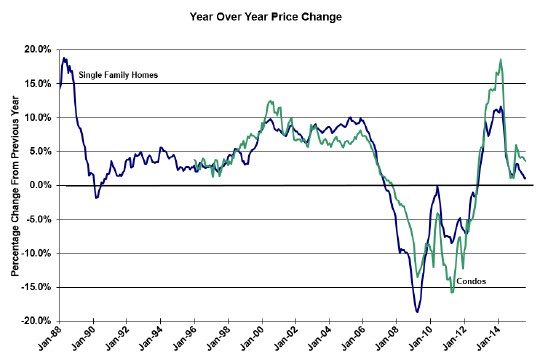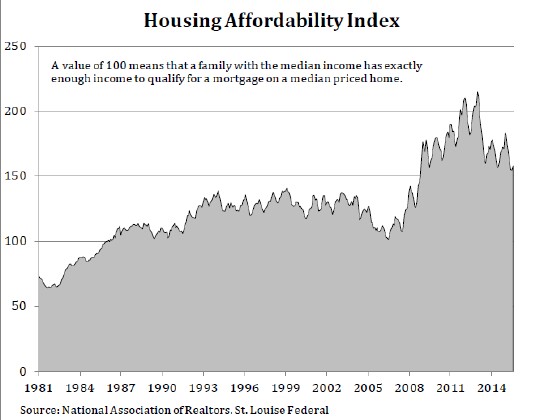For some time now Chicago has been bouncing around near the bottom of the 20 metro areas tracked by Case Shiller in terms of year over year single family home price gains. With this morning’s release of the September Case Shiller home price index we ended up dead last with only a 1.1% gain. The next lowest metro area was Washington with a 2.1% gain. At the other end of the spectrum were metros like San Francisco (of course) and Denver with 11.2% and 10.9% gains respectively. And, heck, Detroit turned in a 5.6% gain. Will we ever have our day in the sun?
The graph below shows the long term trend in year over year gains. The good news is that condo prices are still showing much healthier year over year gains at 3.6% but that is the lowest number in 9 months.
I’ve got the actual Chicago index values plotted below for condos and single family homes along with the trendline for single family homes based upon the pre-bubble period. Single family home prices were down 0.4% while condo prices dropped 0.3%. Keep in mind that this is the time of year that prices start to drop anyway so you can’t draw any easy conclusions from those data points.
Looking at the current levels relative to the bubble peak and it’s aftermath we see that single family home prices in Chicago are still 21.4% below the peak and condo prices are still 15.9% below the peak. However, the good news is that single family home prices have recovered a total of 29.0% from the bottom and condos are up 39.2% from those dark days.
On the other hand single family home prices are lower than they were during most of the period from July 2003 through January 2009 and condos are lower than they were from October 2003 through November 2009. In addition, single family home prices are tracking 23.1% below the trendline.
David M. Blitzer, Managing Director and Chairman of the Index Committee at S&P Dow Jones Indices reflected on the potential impact of rising interest rates on home prices:
…most analysts expect the Federal Reserve to raise its Fed Funds target range to 25 to 50 basis points, the first increase since 2006. While this will make news, it is not likely to push mortgage rates far above the recent level of 4% on 30 year conventional loans. In the last year, mortgage rates have moved in a narrow range as home prices have risen; it will take much more from the Fed to slow home price gains.
Blitzer also commented on the likelihood of us being in another housing bubble. He looks at the change in home prices vs. the change in rents over time and concludes that, because there is not a huge spread between the two recently, we are not in a bubble. Personally I didn’t find the data compelling because I would think you would really want to track the relative cost of the two options, not the changes, to make that determination. In other words, when renting is much cheaper than buying you may be in a bubble. But that’s my $.02.
Blitzer also addressed the issue of housing affordability which gets a ton of airtime these days. It’s pretty clear from the data that housing is quite affordable.
Another question raised by consistent real (or inflation adjusted) home price increases is whether the prices are squeezing people out of the market. One measure of affordability is based on median income, median home price, and mortgage rate; a value of 100 on the chart below indicates a home buyer at the median income can afford the median price home. As shown on the chart, affordability is more than adequate for a median income buyer now but has slipped a bit recently.
It should be noted that the drop in mortgage rates has had a lot to do with the improvement in housing affordability over the longer time period as well as since the bubble burst.
#CaseShiller #Realestate #HomePrices
Gary Lucido is the President of Lucid Realty, the Chicago area’s full service discount real estate brokerage. If you want to keep up to date on the Chicago real estate market, get an insider’s view of the seamy underbelly of the real estate industry, or you just think he’s the next Kurt Vonnegut you can Subscribe to Getting Real by Email. Please be sure to verify your email address when you receive the verification notice.


